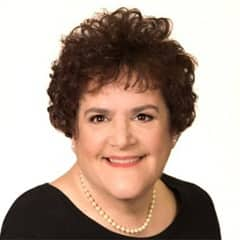What is Organizational Leadership?

Understanding the numbers
When reviewing job growth and salary information, it’s important to remember that actual numbers can vary due to many different factors—like years of experience in the role, industry of employment, geographic location, worker skill and economic conditions. Cited projections are based on Bureau of Labor Statistics data, not on SNHU graduate outcomes, and do not guarantee actual salary or job growth.
The company CEO, army general, political party leader, school superintendent, department head, team coach — these are but a few examples representing one of the fundamental components of organizational leadership.
Inside of every organization, there must be a person responsible for directing or guiding the group.
What is the Meaning of Organizational Leadership?
According to the National Center for Education Statistics (NCES), organizational leadership "focuses on leadership skills that can be applied to a business, government, nonprofit or educational setting."
But what distinguishes an organizational leader (OL) from, say, a functional manager or an executive with other leadership qualities?
“(Organizational leaders are) future visionaries and forward-thinkers who lead broad initiatives using integrity and ethics,” according to Dr. Linda Ellington, an associate dean of business at Southern New Hampshire University (SNHU).
Organizational leadership, then, is a management approach in which leaders help set strategic goals for the organization while motivating individuals within the group to successfully carry out assignments in service to those goals.
What Are Examples of Organizational Leadership Skills?

“You have to be people-oriented,” said Dr. Lowell C. Matthews, a professor of organizational leadership at SNHU and leader within several national professional and nonprofit organizations. “Organizational leadership is about leading and managing individuals toward achieving a strategic organizational goal. So, an OL is a change-agent, someone who sees the big picture but also understands the processes or steps to making change happen.”
It’s one thing to learn about a subject. But what essential skills and mindsets serve as the backbone of organizational leadership?
According to Ellington, who spent 23 years in leadership roles at a Fortune 100 company before joining SNHU full-time, there are a variety of soft skills, such as:
- Communicating (especially listening) effectively
- Problem-solving and decision-making
- Relationship- and team-building
- Using integrity and ethics
Other necessary OL skills Ellington noted include:
- Developing leadership potential in others
- Identifying future innovations and opportunities
- Spreading the organization’s vision and inspiring others to share in that vision
- Thinking strategically, system-wide and holistically
- Understanding your business environment and operations

You might also explore topics related to business psychology or organizational psychology while studying human behavior within institutions.
“People are not empty vessels,” Ellington said. “They have unique experiences, talents and knowledge.” And if they have the drive, commitment and passion to learn about organizational leadership, the necessary skills, mindsets and business knowledge can be taught, according to Ellington.

Of course, some people learn these skills through real-world experiences. Yet the benefit of an education, either at the bachelor's or master's level, is the chance to study theories about motivation, strategy and leadership, and then put those theories into practice without the same level of risk.
“After all, the practice is when you make mistakes — and we all make mistakes,” said Ellington. “The difference is that in an education setting, no one is going to get fired or lose their company or go into debt. We provide a safe sandbox or playground for our students to try simulations and develop confidence in their abilities.”
Ideally, theory and practice go hand in hand.
“The analogy that I use for my students is that of a medical doctor who goes to medical school and obtains their degree,” said Matthews, who strives to incorporate experiential and project-based learning in his courses. “They know the theory, but until they start practicing medicine with patients, the theory only gets you so far.” Conversely, of course, patients generally want a doctor who also has the theoretical training, not just medical knowledge that comes from learning “by doing.”
Find Your Program
Why Choose a Career in Organizational Leadership?

“If your goal is to influence people and impact the organization at the highest level possible, then you want to learn about organizational leadership,” said Deborah Gogliettino, an associate dean of business programs at SNHU with 25 years of experience in human resources leadership.
Matthews agreed. “A person with a degree in organizational leadership can be expected to fill a management or leadership role in an organization that has to constantly be prepared for change,” he said. “These roles may be in human resources or more supervisory positions that are industry-specific. The good thing about OL is that it’s needed for all types of organizations.”
For instance, the U.S. Bureau of Labor Statistics (BLS) reported that some of the top employers of human resources managers in 2023 included:
- Companies and enterprises
- Government
- Healthcare and social assistance
- Manufacturing
- Scientific and technical services
As a result, it’s possible for organizational leaders to find workplaces that align with their values, according to Gogliettino.
The other potential benefit of work in this field is with regard to compensation. According to BLS, the median annual salary for management occupations was $116,880 in 2023.*

Is a Degree in Organizational Leadership Worth It?
Most management occupations require at least a bachelor's degree, BLS reported. Some aspiring leaders choose to earn an advanced degree to improve their employment prospects.

"After being passed over for leadership positions, I decided I needed to improve my marketability and increase my chances of advancement," said Christopher McGinnis '23G.
That's when he decided to earn his master's in organizational leadership from SNHU.
He said his degree improved his communication and leadership skills, while also teaching him about important concepts like change management. "There were a great deal of real life and directly applicable lessons," he said. "The lessons focused on practical application as opposed to just theoretical."
You could earn an online degree at your own pace in tandem with your current role, too, to build upon your workplace skills and experience.
While some jobs have “organizational leader” in the title, more often than not, OL isn’t the title on your employee ID, according to Ellington. Instead, she said, “it’s the mindset, the talent, the love of people and the courage and desire to drive and influence change. An OL has the ability to look wider and deeper, and to bring an advanced skillset to (a) company’s decision-making and strategic thinking.”
Gogliettino noted the OL is a person in a position of influence. “That can be an HR person or someone in benefits, it could be an administrator for a not-for-profit or a small business owner." she said. "There are lots of titles for which a person could be the OL. The real question is: Does this job or position help the organization move forward?”
Looking ahead, Gogliettino said the job and career prospects in organizational leadership are constant and long-term. "There is always going to be a need for skilled organizational leaders — today, tomorrow and afterward," she said. "Organizations will always embrace someone who can bring a vision, especially one of growth and sustainability. That’s a trend I don’t ever see going away."
Discover more about SNHU’s online organizational leadership degree: Find out what courses you'll take, skills you’ll learn and how to request information about the program.
*Cited job growth projections may not reflect local and/or short-term economic or job conditions and do not guarantee actual job growth. Actual salaries and/or earning potential may be the result of a combination of factors including, but not limited to: years of experience, industry of employment, geographic location, and worker skill.
Rebecca LeBoeuf Blanchette ’18 '23G is a writer at Southern New Hampshire University, where she earned her Bachelor of Arts in Communication with a minor in Professional Writing and a Master of Arts in English and Creative Writing with a concentration in Nonfiction. Connect with her on LinkedIn.
Explore more content like this article

Academic Spotlight: Dr. Ashley Dellosa, Associate Dean of Business

What Does a Bookkeeper Do? A Look Into the Role and Necessary Skills

What is an Economist? Where They Work and What They Do
About Southern New Hampshire University

SNHU is a nonprofit, accredited university with a mission to make high-quality education more accessible and affordable for everyone.
Founded in 1932, and online since 1995, we’ve helped countless students reach their goals with flexible, career-focused programs. Our 300-acre campus in Manchester, NH is home to over 3,000 students, and we serve over 135,000 students online. Visit our about SNHU page to learn more about our mission, accreditations, leadership team, national recognitions and awards.


